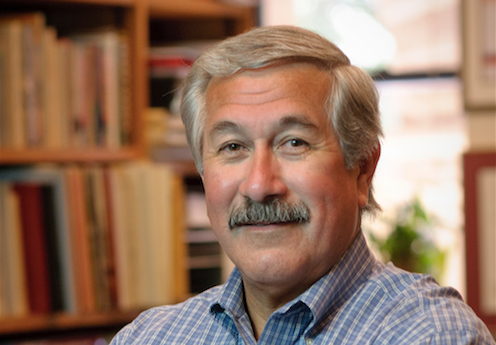Al Camarillo - SVL Cultura Ambassador

 Two of his books, Chicanos in a Changing Society: From Mexican Pueblos to American Barrios (Harvard University Press, 1979, six printings; Southern Methodist University Press edition, March 2005) and Chicanos in California: A History of Mexican Americans (Boyd and Fraser, 1984, four printings) have been widely read. His most recent book, comparing the history of various major ethnic and racial minority groups in American cities, entitled The Racial Borderhoods of America: Mexican Americans and the Changing Racial/Ethnic Landscapesin Cities, 1850-2000, will be published by Oxford University Press next year. He is currently working on a book entitled Going Back to Compton: Reflections of a Native Son on Life in an Infamous American City.
Over the course of his career, Camarillo has received many awards and fellowships. Awards for research and writing include a National Endowment for the Humanities Fellowship and a Rockefeller Foundation Fellowship; he was also a fellow at the Center for Advanced Study in the Behavioral Sciences and at the Stanford Humanities Center. His awards for teaching are also numerous. He is the only faculty member in the history of Stanford University to receive the six highest awards for excellence in teaching and service to undergraduate education and the Stanford alumni. At Stanford’s Commencement in 1988 and in 1994 respectively, he received the Lloyd W. Dinkelspiel Award for Outstanding Service to Undergraduate Education and the Walter J. Gores Award for Excellence in Teaching. In 1997, he was awarded the Bing Teaching Fellowship Award for Excellence and Innovation in Undergraduate Teaching. In 2005, Camarillo was awarded the Miriam Roland Prize for Volunteer Service, an award that recognizes a Stanford faculty member who “over and above their normal academic duties engage and involve students in integrating academic scholarship with significant volunteer service to society.” He and his family members were selected the “2007 Family of the Year” by the Hispanic Foundation of Silicon Valley for the award that recognizes extraordinary contributions to community service. Most recently, he received two awards from Stanford, both in 2011: the Richard W. Lyman Award from the Stanford Alumni Association and the President’s Award for Excellence in Diversity.
In addition to teaching and research, he has occupied several administrative positions: founding Director of the Stanford Center for Chicano Research (1980-1985); founding Executive Director of the Inter-University Program for Latino Research (1985-1988); Associate Dean and Director of Undergraduates Studies in the School of Humanities and Sciences (1991-1993); founding Director of the Center for Comparative Studies in Race and Ethnicity (1996-2002); and Special Assistant to the Provost for Faculty Diversity. In 2002 he was named the Miriam and Peter Haas Centennial Professor in Public Service. He is a past President of the American Historical Association-Pacific Coast Branch (2006) and is currently the President of the Organization of American Historians.
Two of his books, Chicanos in a Changing Society: From Mexican Pueblos to American Barrios (Harvard University Press, 1979, six printings; Southern Methodist University Press edition, March 2005) and Chicanos in California: A History of Mexican Americans (Boyd and Fraser, 1984, four printings) have been widely read. His most recent book, comparing the history of various major ethnic and racial minority groups in American cities, entitled The Racial Borderhoods of America: Mexican Americans and the Changing Racial/Ethnic Landscapesin Cities, 1850-2000, will be published by Oxford University Press next year. He is currently working on a book entitled Going Back to Compton: Reflections of a Native Son on Life in an Infamous American City.
Over the course of his career, Camarillo has received many awards and fellowships. Awards for research and writing include a National Endowment for the Humanities Fellowship and a Rockefeller Foundation Fellowship; he was also a fellow at the Center for Advanced Study in the Behavioral Sciences and at the Stanford Humanities Center. His awards for teaching are also numerous. He is the only faculty member in the history of Stanford University to receive the six highest awards for excellence in teaching and service to undergraduate education and the Stanford alumni. At Stanford’s Commencement in 1988 and in 1994 respectively, he received the Lloyd W. Dinkelspiel Award for Outstanding Service to Undergraduate Education and the Walter J. Gores Award for Excellence in Teaching. In 1997, he was awarded the Bing Teaching Fellowship Award for Excellence and Innovation in Undergraduate Teaching. In 2005, Camarillo was awarded the Miriam Roland Prize for Volunteer Service, an award that recognizes a Stanford faculty member who “over and above their normal academic duties engage and involve students in integrating academic scholarship with significant volunteer service to society.” He and his family members were selected the “2007 Family of the Year” by the Hispanic Foundation of Silicon Valley for the award that recognizes extraordinary contributions to community service. Most recently, he received two awards from Stanford, both in 2011: the Richard W. Lyman Award from the Stanford Alumni Association and the President’s Award for Excellence in Diversity.
In addition to teaching and research, he has occupied several administrative positions: founding Director of the Stanford Center for Chicano Research (1980-1985); founding Executive Director of the Inter-University Program for Latino Research (1985-1988); Associate Dean and Director of Undergraduates Studies in the School of Humanities and Sciences (1991-1993); founding Director of the Center for Comparative Studies in Race and Ethnicity (1996-2002); and Special Assistant to the Provost for Faculty Diversity. In 2002 he was named the Miriam and Peter Haas Centennial Professor in Public Service. He is a past President of the American Historical Association-Pacific Coast Branch (2006) and is currently the President of the Organization of American Historians.
Leave a comment
Comments will be approved before showing up.




